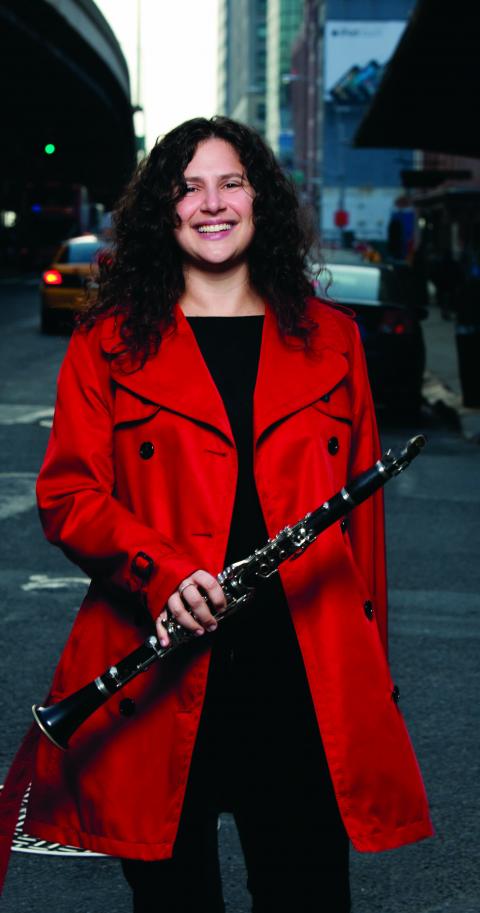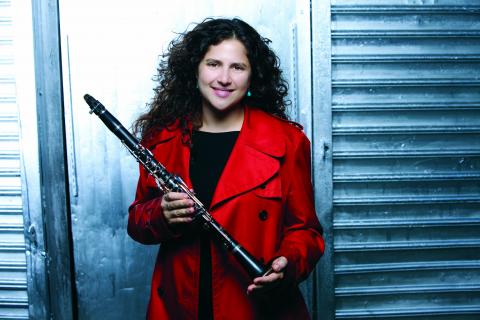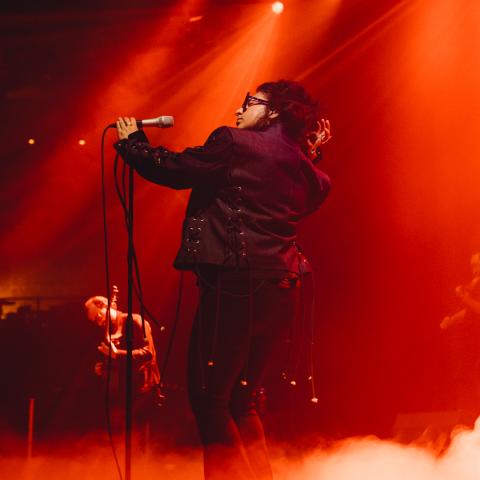Stories from the Promised Land

Anat Cohen '98
Jimmy Katz

Anat Cohen '98
Jimmy Katz

Anat Cohen '98
Jimmy Katz
Anat Cohen took an unpredictable path from her native Tel Aviv, Israel, to New York where she has become the most visible musician of her generation to champion the clarinet in jazz. Top critics writing for the New York Times, the Washington Post, JazzTimes, and other publications have warmly embraced her recordings and live work. In 2007 and 2008, Cohen held the top position in readers' and critics' polls in DownBeat magazine and made history when the Jazz Journalists Association dubbed her clarinetist of the year for two consecutive years.
Cohen grew up in a home with parents who nurtured the musical interests of their three children (see "The Three Cohens" on page 15). In her pre-teen years, Cohen began classical studies on the clarinet. She didn't start improvising until she was 16 when she put the clarinet aside and took up tenor saxophone to better fit into high-school jazz ensembles led by directors who favored the sound and style of contemporary jazz.
Following graduation, Cohen played tenor saxophone for two years in the Israeli Air Force Band before entering Berklee in 1996. Berklee Professor Phil Wilson detected something distinctive in her clarinet playing and encouraged her to develop it. The instrument has since become Cohen's calling card and gateway to a vast world of musical styles and possibilities. On any given night, she might easily be found in a New York club playing with a Dixieland band, Sherrie Maricle & the Diva Jazz Orchestra, a Brazilian choro ensemble, or with the Duduka Da Fonseca Jazz Quintet. Or she may be leading her own group in her original compositions at jazz clubs and festivals anywhere in America, Europe, South America, Israel, or Japan.
Cohen credits growing up in Israel - a cultural crossroads and destination for immigrants from Europe, the Americas, and Africa - for her multifarious musical palette. Her recorded output includes four albums on which she is the leader on her own Anzic Records label. Released in 2005, Place & Time features Cohen on saxophone and clarinet playing six originals as well as songs from Latin America. In 2007 she released Poetica and Noir. Poetica showcases Cohen's clarinet in a variety of jazz and classical-tinged arrangements of music from Japan, Israel, France, Brazil, as well as John Coltrane's "Lonnie's Lament."Noir is an expansive collection featuring Cohen's saxophone and clarinet backed by an 18-piece jazz orchestra traversing stylistic territory that includes Latin music, Dixieland jazz, and modern standards. ForNotes from the Village, Cohen brought her quartet into the studio to play an equally diverse set of tunes polished during their live appearances. Early this year, Cohen will release a CD recorded live at the Village Vanguard, a tribute to jazz clarinet icon Benny Goodman.
With its vibrant jazz and world music scenes, New York has been a promised land of sorts and the perfect locus for Cohen professionally and personally. After our interview at her Greenwich Village home in late November, we walked a block to catch a cab at the street corner. Along the way, she hailed neighbors, shopkeepers, even the Fed-Ex deliveryman with her inextinguishable smile. She credits the late Arnie Lawrence, a jazz educator and the former Tonight Show Band saxophonist, with helping her to become "an individual with a story to tell in the notes and silences." Anat Cohen definitely has something to say, and an increasing number of people are listening.
Did growing up in Israel have a big influence on your music?
Wherever you grow up shapes who you are musically and personally. [Modern] Israel is a young country and a country of immigrants. People have moved there from Eastern Europe, South America, and Morocco and brought the music of different cultures with them. Israeli music is a mixture, a real blend. I grew up listening to songs that were translated from, let's say, Russian into Hebrew. African rhythms from Morocco and rhythms from Brazil and Venezuela were also incorporated into the music.
People know I have Jewish roots and, when they hear me playing the clarinet, they immediately think of klezmer music. But I've also played a lot of Brazilian choro music. The clarinet has a certain expressive cry that is heard in both klezmer and choro. I never wanted to really explore and perform klezmer music, but it is part of what I heard growing up. As regards Middle Eastern influences, in Israel I also heard the sounds of the muezzin calling the Muslim people to pray and quarter-tone music. It was all part of the mixture and shaped who I am musically. It's common for Israeli musicians to play in a lot of different musical scenes. They play in Latin and world-music groups as well as with jazz and experimental musicians. I think it's a result of growing up hearing all these rhythms as part of the popular music on the radio.
When did you start tuning into jazz?
I was about 16 when I started playing clarinet in a conservatory Dixieland band. It was the first jazz I ever played, and at the time I didn't know anything about improvising. All the parts and solos were written out. I didn't care; I just loved the feel of early jazz. I had played classical music first and learned to be aware of dynamics and blending with the other players and always knowing where I was in the music. It should be that way no matter what music you play. In the Dixieland band, I loved hearing the melody moving from the low instruments to the high and having players stand up for their solos. That music is so positive, happy, beautiful, emotional, and simple. I didn't realize how much I loved it until I began recently playing with the Louis Armstrong Centennial Band at Birdland on Wednesday nights.
How did you make the transition from reading the solos to improvising the fluid lines for which you are known?
The next step for me was to join the conservatory big band and play traditional charts. I had a crazy fear of improvising that I can't explain. I entered an arts high school as a classical clarinetist and soon became a jazz major. From there I started studying scales and what notes to play. I went through a period of looking for the right notes with my brain rather than my ears or my heart, but I felt the balance was off. You need to be somewhat intellectual in jazz, but if the intellect takes over, I don't think you are really making music with other people. The beautiful thing about being a jazz musician is that it is a never-ending exploration.
Lately, it seems you have focused on developing your jazz voice on the clarinet.
It wasn't my choice. I feel as if the clarinet chose me. I played saxophone in the high-school band because the clarinet seemed out of fashion. My teachers liked more contemporary jazz and told me not to bring my clarinet, bring a saxophone. So I put it aside for a while. When I was at Berklee, I had the good fortune of working with Phil Wilson. I was mainly a tenor player, but he heard me play clarinet and told me he thought I had a voice on that instrument and that I should develop it. He asked me to play clarinet, but I didn't have improvising skills on it at the time.
Also at Berklee, I met musicians from Argentina and Brazil and started playing the clarinet with them on folkloric music. I played with [flutist] Fernando Brandão for a choro night at Ryles, and soon I was being asked to play by more people. Now, the clarinet is taking over my life, and I'm letting it. In 2007, I put out the album Poetica that basically says, "I play only clarinet." More and more people call me to play clarinet in Latin and folkloric music or jazz. The balance of clarinet to saxophone in my own shows has shifted to mostly clarinet. It happened organically.
With a few notable exceptions, there have been few stars of the clarinet since Benny Goodman.
It is incredible to me the Benny Goodman was so popular, a pop star in 1938 who was a clarinetist. Kids went crazy over his music. In 2009, if you mention clarinet, people still think of Benny. The instrument is still associated with ethnic music and old-style swing jazz. I was concerned that if I was labeled as a swing player, I might not get out of it.
I've noticed that on your albums there are not a lot of tunes with a swing groove.
That's kind of interesting, because swing is a big part of my musical life. I've played with the Diva Jazz Orchestra for about 10 years, played straight-ahead gigs, and done sessions for Arbors Records [a label specializing in traditional jazz]. But when it came to making my own records, I was looking for something else. Even today, people ask me what kind of music I play, and it is hard to describe. There are all kinds of grooves and musical elements. When jazz started, it was a mixture of cultures. It's an American art form but has always been about the mixture. Today people blend things very obviously. A group may take a rhythm from Senegal and have a singer from Brazil and a percussionist from some other part of the world. Swing is still a big part of jazz, but in a bigger sense it is about improvising and musicians interested in exploring on the spot and communicating. That's the spirit of jazz to me.
In what major did you earn your degree from Berklee?
When I came to Berklee, I had performing experience and wanted to know more about other things to have more options, so I became a professional music major. I took some composition and film-scoring courses so I could be involved with other departments. All of the teachers who were passionate about what they were doing made an impression on me: Ed Tomassi, Hal Crook, Greg Hopkins, George Garzone, Billy Pierce, and Jamey Haddad. John LaPorta made me learn how to read concert parts-notes and changes-not just transposed parts. That has come in very handy in my career.
It was a special time when I was there. I've met others around the world who were there then, and they all have the same feeling. There was a nice group of students who played together a lot. There was a certain naive optimistic spirit among the students that was really beautiful. If I meet someone in Venezuela who was there when I was, we still have a feeling of family.
How did things unfold for you in NY?
I came to New York in 1999 and got involved with Latin and Brazilian musicians. Later, I started hanging out with the musicians who had created a scene at Smalls in the Village. Those musicians had a respect for the [jazz] tradition but were open to the world and weren't afraid to incorporate other things in their music. That's when I started writing my own music. My Place & Time album came from that.
Has composing become a larger part of your musical identity?
It's definitely something I want to do more of. I feel that in your compositions, you create the surroundings for your improvisations. Arrangements are very important, but compositions tell who you are musically. I like bringing my compositions to other musicians to see where they will take them. It's fascinating how one group of players will make something sound a certain way and another group will take it in another direction. In the improvised sections, the musicians have the freedom to go wherever they want. I don't like to limit them by telling them exactly what to play.
When you hear a young player, do certain qualities tell you he has something special?
The first thing you hear is the sincerity of the player. You can't expect a young person to have all their ideas fully formed. They may take longer to say what they want and be very excited. Players can be musical in how they listen, the length of what they play compared to what others played, their understanding of dynamics, and more. I look for a player's awareness. I want to see someone who is trying to make music, not just getting in front of an audience and yelling everything they want to say. They should want to have a conversation and create something. You notice immediately [when someone] has something to say.
Are you planning another CD?
I have a CD coming out [that was] recorded live at the Village Vanguard. I did a show to mark Benny Goodman's centennial. I'd never done a tribute to him, so I took some of his repertoire and played it my own way, not trying to imitate him. Benny Green [piano], Lewis Nash [drums], and Peter Washington [bass] played with me. The album will be called Clarinet Work: Benny Goodman and Beyond. I didn't know how it was going to sound. We played at the Vanguard for a week and recorded the last night. We learned how to play and give each other space. Obviously, this album will have all swing tunes.
| "The clarinet is taking over my life, and I'm letting it." |
You've been warmly embraced by major critics and won polls. Have these things helped your career?
To have people at the New York Times devote space to my music has been amazing. It is easy for someone to record and release a CD; it's a business card in a way. But how do you get people to listen or get someone at a radio station to choose your CD out of the many they got that morning? In a way I feel fortunate that someone noticed my CDs.
It is really cool to meet people for the first time who love your music and to find out that they checked it out because they heard about it and were curious. Getting recognition for my clarinet playing or compositions is a great honor. It puts a certain responsibility on me because I feel I have to fulfill expectations. It's amazing to be recognized for just doing what I do. I wasn't trying to win a poll. I am extremely honored because there are so many great musicians out there and so many recordings on the market.
The real rewards for me, though, come when I am onstage playing the music I want with people I chose, and the music takes off and goes to the music sphere and the musicians and audience get sucked into it. Everyone is in it together when we are creating something that we didn't know was going to happen. The musicians and the audience get caught up in the same musical moment and are really feeling it. That's the best reward of this whole journey.
On your last CD, Notes from the Village, you gave plenty of room to the players. Even though you're the leader, you didn't dominate the spotlight.
I wanted to replicate the spirit of the live shows we'd done for a year or so. I just wanted the group to play and for everyone to be who they are not worrying about how long the songs were or radio play. It was nice to just play and not limit the number of choruses the musicians would take.
Let's talk about your writing. Do you compose at the piano?
I write at the piano even though I can't really play it very well. It allows me to play different melodies in each hand and find the harmonies. It's important to compose on different instruments. When I write, the melody is usually what attracts me. If the melody hasn't come first, then the chords and melody come together. But sometimes you get to a point in the composition where you have to figure out the harmony first to get to the next section.
Have you thought about the future and if you will stay based in the US?
Life happens when you make other plans. It's hard for me to predict what will happen. I didn't plan any of this, I'm just going with the flow, and I like where it's going. There can be other considerations, like family. I am open. If life takes me back to Israel, I'll go. If not, I'll stay here as long as I can.




